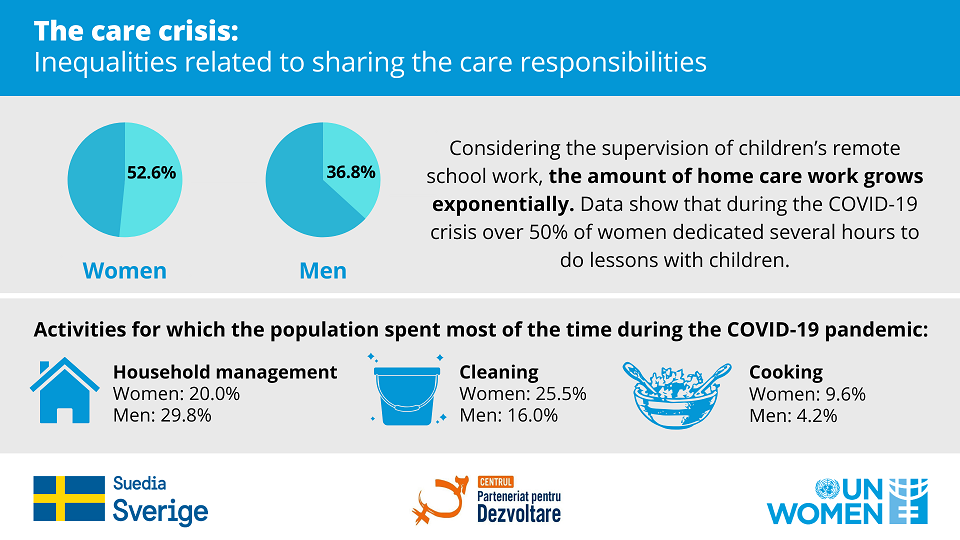Results of the assessment on how COVID-19 impacts the social and economic life in terms of gender equality
UN Women Moldova and Centre "Partnership for Development" (CPD) presented the results of the research on how COVID-19 impacts the social and economic life in terms of gender equality.Date:

This analysis identifies the pandemic effects on women and men, focusing on their short- and long-term needs, as well as on how women and men respond to the new social and economic challenges. The analysis particularly reveals the impact of pandemic-induced crisis on gender roles and on women empowerment.
“During the past months of the COVID-19 pandemic, we have seen women who are losing employment opportunities, running out of business, losing their livelihood and income security because of the lockdown and isolation. Women are also more involved now in the unpaid care work and household activities which are impacting their professional life. Besides, anecdotal evidence is showing us increased cases during the outbreak.
All of these present a very strong signal on the impact COVID-19 is having on women and urgent need for these to be addressed. That is why we did this rapid assessment to have an overview of how women and men from the Republic of Moldova are being affected by this outbreak. UN Women will continue to partner with government, civil society, private sectors in ensuring that the recovery efforts put into consideration the needs of all women being affected by this pandemic. In this context, it is key that women from national to community levels are part of the discussions and decision making for response efforts to COVID-19 – including in planning, budgeting, and monitoring at all levels, as well as continuing to support initiatives that protect and promote women’s rights”, said Peterson Magoola, Representative a.i for UN Women Moldova during the event.

“COVID-19 pandemic and the lockdown measures revealed the weakest chain: caretaking. The pandemic has worsened the inequalities in distribution of household chores between women and men. Thus, during the social isolation women have assumed most of the household work and caretaking for children and the family, which limited their opportunities to interact with anyone else but their family members. This affected the women’s emotional health, with them being more exposed to anxiety and frustration during the pandemic crisis”, declared Natalia Covrig, Public Policy Assistant, Center "Partnership for Development".

Rodica Ivașcu, Program Director, Center "Partnership for Development" also states that: “The pandemic crisis has affected the economic condition of both women and men. On the one hand, even before the crisis women had a lower presence on the Moldovan labour market, but during the pandemic women had to withdraw even more from the labour market due to the unequal distribution of care work. We don’t exclude that in the immediate future women, especially the ones with children, will be less active, will work fewer hours or will work remotely, having thus an unequal transition to the labour market. On the other hand, the research has revealed that men were affected more in terms of observing their labour right and we anticipate that many of them will not benefit of social or health insurance. Thus, many men reported being forced to take unpaid holidays and being at risk of losing their job in the near future. This is explained by their broader presence in the informal sector. This logical chain, caused by the pandemic crisis, also impacts their income-generation opportunities, with the financial vulnerability being caused by the sharp decrease in remittances and salary income. In the medium term, many women, especially the ones from the rural area, risk to become financially vulnerable. The survey has revealed that as much as 63% of women will hardly cover their basic needs (such as buying food, hygienic products etc.) if anti-pandemic measures are maintained. This situation definitely needs to be monitored on a continuous basis.”

Data were collected at the request of UN Women Moldova, on a sample of 1003 persons aged 18+, representative for the country’s adult population, except for inhabitants on the left bank of the Nistru river. The research is based on a stratified, probabilistic sample. Data were collected by telephone survey, with a maximum error of +3.1%, during 13-26 April 2020.
The research was performed by Center ‘Partnership for Development’ (CPD), in collaboration with the United Nations Entity for Gender Equality and the Empowerment of Women (UN Women) and was funded by Sweden. Data were collected by ‘CBS-AXA’ Center of Sociological Investigations and Marketing Research.